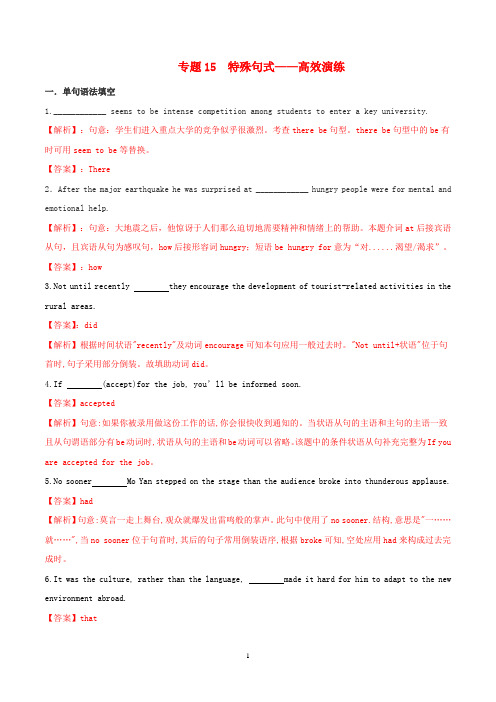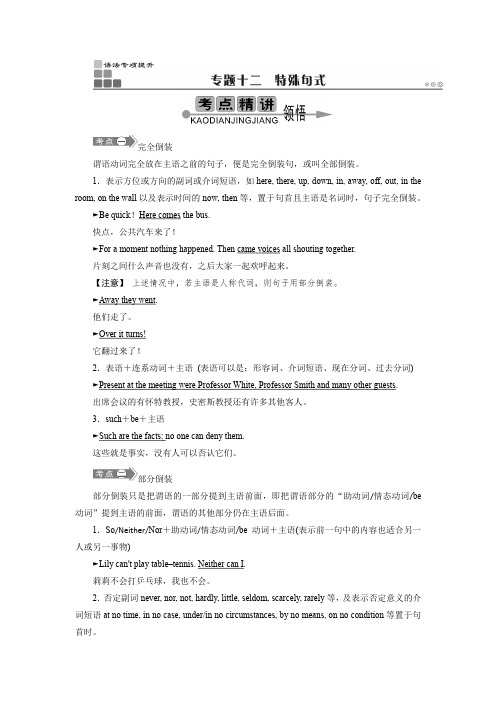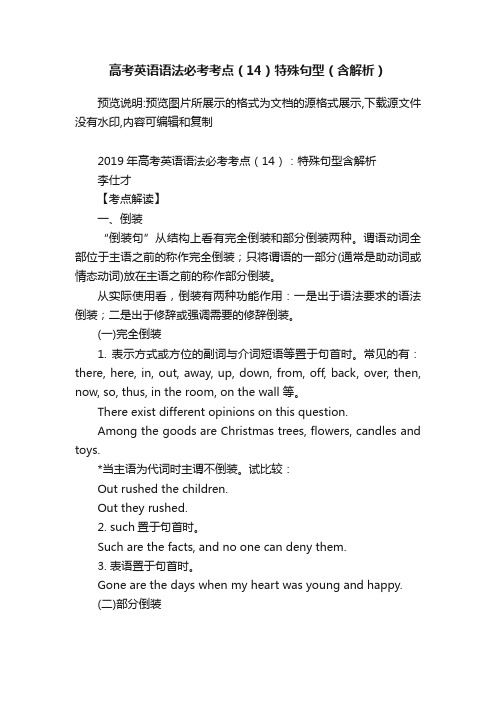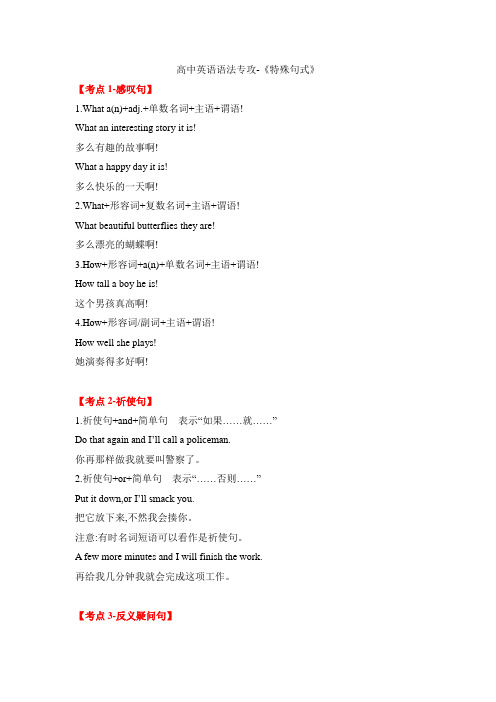高中英语---特殊句式全面讲解及练习(含问题详解)
高中英语倒装句等特殊句式讲义以及练习题(高考总复习,纯干货,原创)

第一个我们来学习倒装句,倒装属于单选常考的知识点,而且也是写作中的较高级句式了。
一、倒装:完全倒装、部分倒装、形式倒装(假倒装)***倒装句口诀:地点全倒装,son也虚假关于完全倒装“地点全倒装”的意思是:句子中将表示地点、时间等方位位置或者时间的副词、介词等词提前时,句子要全部倒装。
全部倒装的句式结构:地点+谓语+主语。
1.表示地点方位位置的副词、介词,运动方位的副词(under,there,here,out,in,up,down,away,near,opposite……)、时间的副词(now,then)位于句首时, 句子要全部倒装。
A girl sits under the tree倒装后变为Under the tree sits a girl.注意完全倒装中,代词做主语不倒装.如果说这句话是代词做主语:She sits under the tree.那么即使是将描述地点的介词提前,这句话也不倒装,而是变为Under the tree she sits.练习题(1)A bus comes here.= _______________________________________________________ 练习题(2)Your turn comes now.= ____________________________________________________Here/there句型用一般现在时,代词做主语不倒装;Here you are. Here it is.关于部分倒装口诀的下半句中“S on也虚”对应部分倒装,我们来看一下部分倒装的结构。
部分倒装的句式结构:就是将部分倒装标志词提前以后,句子变为一般疑问句语序。
即:标志词+助动词/be动词/情态动词+主语+其他……S:So/such……that……(注意:“主倒从不倒”,也就是说是so/such所在的主句倒装,that后的从句不用倒),看例句:He speaks English so clearly that he can always make himself understood.=so是标志词,所以so clearly这个意群提前(举个例子来说意群:一辆出租车来了=来了一辆出租车,其中“一辆出租车”这几个字不能拆分,它就是一个意群),然后再将主句调整为上边说的部分倒装句式结构。
高考英语 必考点 专题15 特殊句式(高效演练)(含解析)

专题15 特殊句式——高效演练一.单句语法填空1.____________ seems to be intense competition among students to enter a key university.【解析】:句意:学生们进入重点大学的竞争似乎很激烈。
考查there be句型。
there be句型中的be有时可用seem to be等替换。
【答案】:There2.After the major earthquake he was surprised at ____________ hungry people were for mental and emotional help.【解析】:句意:大地震之后,他惊讶于人们那么迫切地需要精神和情绪上的帮助。
本题介词at后接宾语从句,且宾语从句为感叹句,how后接形容词hungry;短语be hungry for意为“对......渴望/渴求”。
【答案】:how3.Not until recently they encourage the development of tourist-related activities in the rural areas.【答案】:did【解析】根据时间状语"recently"及动词encourage可知本句应用一般过去时。
"Not until+状语"位于句首时,句子采用部分倒装。
故填助动词did。
4.If (accept)for the job, you’ll be informed soon.【答案】accepted【解析】句意:如果你被录用做这份工作的话,你会很快收到通知的。
当状语从句的主语和主句的主语一致且从句谓语部分有be动词时,状语从句的主语和be动词可以省略。
该题中的条件状语从句补充完整为If you are accepted for the job。
(完整版)高考英语特殊句式经典讲解.docx

英特殊句式1.句: It be⋯接that/who其它1.去掉句型后,仍完整。
2.可以,主,,状。
3.状,常含有介,接用 that.4.部分含有定从句。
5.与 not ⋯ until状合, not 和 until 在句中挨着。
6.句的特殊疑形式;疑⋯be.. it..that.. ,序考7.句的特殊疑形式,若在从句中,疑⋯ it..be ⋯ that8.构的省略形式,即被部分后的省略。
9.do(does, did,)用在原形前意必,确。
(只能用于一般式的肯定句 )(1) They couldn ’t say ___it was _____troubled them.A. what; thatB. what, whatC. that whatD. what who (2) It is not who is right but what is right _____ is of importance.(3) It was in China ____Tom first met Mr. Lin.(4) It was ____back home after the experiment .A. not until midnight did he goB. until midnight that he didnC. not until midnight that he wentD. until midnight when he didn’ t go ’t go(5) ---Where did you get to know her ?---It was on the farm _____we worked .A. thatB. thereC. which D .where2.倒装1.与之相的是述;若使用倒装,在句子中会出某些迹象2.种 :完全倒装,(提前);部分倒装(助提前)。
3. 完全倒装:( 1)表示地点的介短在句首;( Vi sit ,live , stand , come , run )( 2)副 in , out,up, down, away, off 在句首,(若主是人称代,不倒装)。
高中英语---特殊句式全面讲解及练习(含问题详解)

高中英语语法讲义第二讲——特殊句式倒装句通常句式为自然语序“主语+谓语”,有时为了强调句子的某一部分,或者出于词汇用法、语法结构或修辞上的需要,将这种比较固定的语序加以颠倒,就形成了倒装。
分为完全倒装,部分倒装和形式倒装。
一.完全倒装:谓语动词完全置于主语之前,主语为名词不为代词,谓语不用进行时。
1.一些表示地点、时间或方位等的副词或介词短语。
如:here, there, now, then, up, down ,in, out,away, off, in the room, on the wall等置于句首。
Down came the rain and up went the umbrella.Then followed three days of heavy rain.Out rushed the children laughing loudly.Away flew the plane.2.such 位于句首。
Such was Albert Einstein, a simple man and the 20th century’s greatest sc ientist.注:此句型中的such多被认为是表语,所以such后的be动词应与其后真正的主语保持一致。
Such are the facts; no one can deny them.二.部分倒装:只把谓语的一部分(助动词,情态动词或be动词)置于主语之前1.so+ be 动词/ 助动词/ 情态动词+主语,意为“...也是如此”。
They love making lots of friends; so do I.2.neither/nor+ be动词/助动词/情态动词+主语,意为“...也不这样”。
Lily can’t ride a bicycle; neither/nor can Lucy.3.否定词never, seldom, nor, not, little, hardly, scarcely等或表示否定意义的介词短语at no time,under/in no circumstances, in no case, by no means, on no condition 等置于句首时。
英语特殊句式讲解及练习

英语中的特殊句型一. 感叹句感叹句是表示说话人说话时的惊异、喜悦、赞赏、愤怒等情绪的句子。
这类句子中有很多是由what和how引导的。
What用来修饰名词或名词短语,how则是修饰形容词,副词或动词。
感叹词所修饰的部分除了动词均须提到前面,句中其余部分用正常语序,句末用感叹号。
(一)感叹句的基本句型1.由what引导的感叹句。
What可与可数名词单数、复数及不可数名词连用。
①what+a/an +形容词+单数可数名词+主语+谓语eg. What a clever boy he is!②what+形容词+不可数名词(weather,advice,news,funs)+主语+谓语eg. What fine weather we are having today!③what+形容词+复数名词+主语+谓语eg. What beautiful flowers these are!2.由how引导的感叹句,how与后面的形容词、副词、动词连用。
①how+形容词或副词+主语+谓语eg. How high the mountain is! How fast he is running!②how+形容词+a/an+单数可数名词+主语+谓语eg. How difficult a problem is!3.省略形式的感叹句①how直接修饰谓语动词:how+主语+谓语eg. How we love our motherland!②省略主语和谓语eg. How wonderful!(二)感叹句的其他句型1.陈述句式感叹句 eg. There’s danger ahead!2.一般疑问句式感叹eg. Am I hungry!3.特殊疑问句式感叹句eg. How can you be so silly!4.祈使句式感叹句eg. Look out!5.as if和if only引导的感叹句eg. If only you were my sister!6.不定式感叹句eg. To think you are so careless!7.副词引导的感叹句eg. Out rushed the children!二.There be 句型There be 句型在英语中表示“什么地方或时间存有什么事物”。
高考英语语法特殊句式专题讲解练习含答案

完全倒装谓语动词完全放在主语之前的句子,便是完全倒装句,或叫全部倒装。
1.表示方位或方向的副词或介词短语,如here, there, up, down, in, away, off, out, in the room, on the wall以及表示时间的now, then等,置于句首且主语是名词时,句子完全倒装。
►Be quick!Here comes the bus.快点,公共汽车来了!►For a moment nothing happened. Then came voices all shouting together.片刻之间什么声音也没有,之后大家一起欢呼起来。
【注意】上述情况中,若主语是人称代词,则句子用部分倒装。
►Away they went.他们走了。
►Over it turns!它翻过来了!2.表语+连系动词+主语(表语可以是:形容词、介词短语、现在分词、过去分词)►Present at the meeting were Professor White, Professor Smith and many other guests.出席会议的有怀特教授,史密斯教授还有许多其他客人。
3.such+be+主语►Such are the facts: no one can deny them.这些就是事实,没有人可以否认它们。
部分倒装部分倒装只是把谓语的一部分提到主语前面,即把谓语部分的“助动词/情态动词/be 动词”提到主语的前面,谓语的其他部分仍在主语后面。
1.So/Neither/Nor+助动词/情态动词/be动词+主语(表示前一句中的内容也适合另一人或另一事物)►Lily can't play table–tennis. Neither can I.莉莉不会打乒乓球,我也不会。
2.否定副词never, nor, not, hardly, little, seldom, scarcely, rarely等,及表示否定意义的介词短语at no time, in no case, under/in no circumstances, by no means, on no condition等置于句首时。
高考英语二轮复习:特殊句式考点练习讲解(含解析)

特殊句式知识点一、倒装句(一)完全倒装(Full Inversion)谓语动词完全放在主语之前的句子便是完全倒装句。
这类句型主要有:1.表示方式、方位的副词或介词短语,如here, there, up, down, in, away, off, out, in the room, on the wall等,置于句首,且主语是名词时。
如:In a lecture hall of a university in England sits a professor.在英格兰一所大学的讲堂里坐着一位教授。
South of the river lies a small factory.一个小型工厂坐落在河的南岸。
Out rushed the children.孩子们冲了出去。
2.such置于句首时。
如:Such was Albert Einstein, a simple man and the 20th century's greatest scientist.这就是艾伯特·爱因斯坦,一个朴实的人,也是20世纪最伟大的科学家。
(二)部分倒装(Partial Inversion)只把谓语的一部分(多为助动词或情态动词)置于主语之前的句子叫部分倒装句。
这类句型主要有三种:1.only修饰副词、介词短语或状语从句,且放在句首时。
如:Only in this way can we learn English well.只有以这种方法,我们才能学好英语。
Only when he returned did we find out the truth.只有当他回来时,我们才查明了真相。
使用特点:(1)在部分倒装句中,如果谓语部分无助动词,则须找助动词来“帮助”它构成倒装句。
如:(×)Only after the war learned he the sad news.(√)Only after the war did he learn the sad news.只是在战后他才知道那个悲惨的消息。
高中英语语法--主谓一致与特殊句式讲解及训练

主谓一致与特殊句式主谓一致主谓一致是指句子的谓语动词和其主语在人称和数上必须保持一致。
主谓一致一般遵循三个原则:语法一致原则、意义一致原则和就近一致原则。
1.语法一致原则主语的单复数决定了谓语动词的单复数。
(1)动名词短语、动词不定式短语、单个从句或不定代词作主语时,谓语动词常用单数。
Listening to music makes me relaxed after a busy day.Everything is in a complete mass, which drives people crazy.[名师指津]what引导的从句作主语时,谓语动词一般用单数形式,但如果从句表示复数意义,则谓语动词用复数形式。
What he said is far from the truth.What the school needs are qualified teachers.(2)主语后跟有with, together with, as well as, like, but, except, along with, rather than, including, in addition to等引起的短语时,谓语动词的数要与前面的主语保持一致。
The teacher as well as his students was very excited.I think Tom, rather than you, is to blame for the accident.(3)and, both ... and ...连接两个不同的主语时,谓语动词用复数形式;但是如果由and连接的两个名词表示同一个人或物时,谓语动词用单数形式。
Her teacher and her friends are in the sitting room.The poet and writer has produced many works.(4)定语从句中关系代词作主语时,从句中的谓语动词的形式要与先行词保持一致。
高中英语 特殊句式 讲解与练习(共59页ppt)

32
[活学巧练] 完成句子
①If a healthy environment is gone,___s_o____is
everything that our life depends on. 如果一个健康的环境 Only after my friend came .
A. did the computer repair
c
B. he repaired the computer
C. was the computer repaired
D. the computer was repaired
23
• “son之n” 否定词位于句首(no,not,never,hardly) Eg: Not until I came home last night did Mom go to bed. Hardly had he got out of the court when the reports raised a lot of questions to him.
Although he is a boy, he is very strong. Boy as he is, he is very strong. “ a“不见了 As he might try, culture couldn’t open the door. Try as he might, culture couldn’t open the door.
36
Eg: It is I that/who am right. (强调主语) It was Lucy that we met at the school gate. (强调宾语) It was in the park that Tom lost his watch. (强调状语)
高中英语之特殊句式教案设计 含练习(含答案)

特殊句式一、倒装“主语+谓语”是英语句子的最基本结构。
如果把谓语放在主语之前,该句就成倒装结构。
1、完全倒装:谓语动词完全放在主语之前的句子,便(1) 在there be结构中There stands an old tree on the top of the hill.(2)在表示方位或时间的副词或介词短语,如:here, there, now, then ,up , down ,in, out, away, off, in the room,on the wall等置于句首,且以名词作主语的句子Here comes the bus. Away flew the birds.Out went the children. Now comes your turn. 现在轮到你了。
【注意】主语是代词就不用倒装,即主谓语序不变。
Away ran the thief. Away he ran.2、部分倒装只把谓语的一部分(多为助动词或情态动词)置于主语之前的句子,叫部分倒装句。
(1) 否定词(hardly, seldom, never, rarely,in no way, under no circumstances, by no means, not only,,,but also, not until…)(2) 表示否定或者半否定意义的副词,介词短语,连词等置于句首。
否定副词never, nor,not, hardly, little, seldom, scarcely, rarely及表否定意义的介词短语at no time, under/in no circumstances, in no case, by no means, on no condition等置于句首时要倒装,不在句首则用正常语序。
Never have I seen such a performance.Hardly do I think possible to finish the job before dark.= I hardly think it possible to finish the job before dark.练一练1. Never in my wildest dreams ____B___ these people are living in such poor conditions.A. I could imagineB. could I imagineC. I couldn’t imagineD. couldn’t I imagine2. Only then ___D____ how much damage had been caused.A. she realizedB. she had realizedC. had she realizedD. did she realize(3) so放在句首,So + adj. /adv…that,意为“如此……以至于……”后接表语或状语,再跟that从句,so后面的主句要倒装,而that引导的从句不倒装。
高考英语语法必考考点(14)特殊句型(含解析)

高考英语语法必考考点(14)特殊句型(含解析)预览说明:预览图片所展示的格式为文档的源格式展示,下载源文件没有水印,内容可编辑和复制2019年高考英语语法必考考点(14):特殊句型含解析李仕才【考点解读】一、倒装“倒装句”从结构上看有完全倒装和部分倒装两种。
谓语动词全部位于主语之前的称作完全倒装;只将谓语的一部分(通常是助动词或情态动词)放在主语之前的称作部分倒装。
从实际使用看,倒装有两种功能作用:一是出于语法要求的语法倒装;二是出于修辞或强调需要的修辞倒装。
(一)完全倒装1. 表示方式或方位的副词与介词短语等置于句首时。
常见的有:there, here, in, out, away, up, down, from, off, back, over, then, now, so, thus, in the room, on the wall 等。
There exist different opinions on this question.Among the goods are Christmas trees, flowers, candles and toys.*当主语为代词时主谓不倒装。
试比较:Out rushed the children.Out they rushed.2. such置于句首时。
Such are the facts, and no one can deny them.3. 表语置于句首时。
Gone are the days when my heart was young and happy.(二)部分倒装1. 当only放在句首,修饰副词、介词短语或状语从句。
Only by shouting at the top of his voice was he able to make himself heard.*only后面接句子主语时,不需要用倒装句式。
Only with the greatest of luck did she manage to escape from the rising flood waters.(2012·上海高考)2. 否定副词或词组not, nor, never, hardly, rarely, few, seldom, little, neither, by no means, at no time, under no circumstances, in no way, at no time置于句首时。
高考特殊句式讲解及练习

高考特殊句式讲解及练习特殊句式(强调句型、省略、反意疑问句及其他)1.强调强调句的基本句型是“It is/was+被强调的部分+that/who+其他部分”。
被强调的部分可以是主语、宾语和状语等。
强调句型的使用特点主要有以下几个方面:(1)被强调的是状语或状语从句时,要用that引导从句,而不能用which,而且通常不能省略。
It was in the park that I met him.我是在公园里遇到他的。
It was in 1964 that the first telephone satellite was set up by the Group of 17 Countries.17国集团发射第一颗电话卫星是在1964年。
(2)被强调的是人时,引导词可用who,也可用that。
Was it you that/who let out the secret to her?是你把这个秘密泄露给她的吗?注意:当被强调的是主语时,代词要用主格形式。
It was I who put forward the theory first.是我最先提出这个理论的。
(3)被强调的不管是单数还是复数名词,主句的be动词都用单数is或was。
It was Madame Curie and her husband who discovered radium.是居里夫人和她的丈夫发现了镭。
It is the PLA men who/that are safeguarding our country day and night.是解放军战士日夜保卫着我们的祖国。
(4)对not...until时间状语从句进行强调时,其句型是:It is/was not until...that从句,即not和until在强调句中总是紧挨着的。
注意习惯上不用not till,而且从句不能用when引导。
It was not until the last operation was finished that Bethune left the battle hospital.直到做完最后一个手术白求恩才离开战地医院。
高考英语语法专攻-《特殊句型》-考点归纳+针对性练习

高中英语语法专攻-《特殊句式》【考点1-感叹句】1.What a(n)+adj.+单数名词+主语+谓语!What an interesting story it is!多么有趣的故事啊!What a happy day it is!多么快乐的一天啊!2.What+形容词+复数名词+主语+谓语!What beautiful butterflies they are!多么漂亮的蝴蝶啊!3.How+形容词+a(n)+单数名词+主语+谓语!How tall a boy he is!这个男孩真高啊!4.How+形容词/副词+主语+谓语!How well she plays!她演奏得多好啊!【考点2-祈使句】1.祈使句+and+简单句表示“如果……就……”Do that again and I’ll call a policeman.你再那样做我就要叫警察了。
2.祈使句+or+简单句表示“……否则……”Put it down,or I’ll smack you.把它放下来,不然我会揍你。
注意:有时名词短语可以看作是祈使句。
A few more minutes and I will finish the work.再给我几分钟我就会完成这项工作。
【考点3-反义疑问句】1.当陈述部分带有宾语从句时,反意疑问部分的主语与谓语常和主句保持一致。
He said that they would come to my birthday party,didn’t he?他说他们要来参加我的生日聚会,是吗?2.当陈述部分主句的谓语动词是think,believe,suppose,guess,expect,imagine,且主句主语为第一人称时,反意疑问部分的主语和谓语与宾语从句的主语和谓语保持一致;当陈述部分主句的主语为第二、三人称时,后面的疑问部分的主语和谓语与主句的主语和谓语保持一致。
They don’t believe he will succeed,do they?他们不相信他会成功,是吗?3.当陈述部分带有seldom,hardly,scarcely,never,few,little,nothing,nobody等否定词时,反意疑问部分用肯定形式。
高中语法学案--特殊句式(附答案)

特殊句式归纳复习一、强调句1.强调句的基本句式:It + be+被强调部分+ that/who …(强调“人” 时也可以用who)We were stuck in the traffic jam at the crossroad just now.1) It ____________________________were stuck in the traffic jam. (强调主语)2) It _____________________________ we got/were stuck in at the crossroad just now. (强调宾语)3) It _________________________________ we got/ were stuck in the traffic jam just now. (强调地点状语)4) It _____________________________we got/ were stuck in the traffic jam at the crossroad. (强调时间状语)5) It was __________who helped ________ out. 是他帮助了她。
6) It was ________________ midnight ___________I went to bed. 直到午夜我才睡觉。
2.强调从句1) It was _________________ (because, since, as) I took a wrong bus ___________ I missed the meeting.2) It was _______________I was reading __________ I fell asleep. 我是在读书时睡着了。
3) It was _____________ I arrived _____________ he left. 他是在我到达以后离开的。
高考英语必考点专题——特殊句式(精讲深剖)(含解析)

专题15 特殊句式——精讲深剖一.单项选择1.(2019天津高考)The professor warned tie students that on no account _____________ use mobile phones in his class.A. should theyB. they shouldC. dare theyD. they dare【答案】A【解析】考查部分倒装。
句意:这位教授警告学生们,在他的课堂上,决不应该使用手机。
on no account 决不,否定词放在句首,句子使用部分倒装,应该做should do,敢于做dare do,根据句意表示”应该“,故选A。
2. (2018北京高考)In any unsafe situation,simply the button and a highly-trained agent will get you the help you need.A.press B.to pressC.pressing D.pressed【答案】A【解析】考查祈使句。
句意:在任何不安全的情况下,只要按下按钮,一个训练有素的代理人就会给你需要的帮助。
根据句子结构可知,此处为祈使句,所以用动词原形。
3. (2018天津高考)It was only when the car pulled up in front of our house we saw Lily in the passenger seat.A.which B.thatC.when D.where【答案】选B。
【解析】考查强调句式。
去掉题干的It was和空处后,这个句子语法结构依然完整,表示“只有当汽车停在我家房前的时候,我们才看到乘客座位上的莉莉”,因此这是一个强调句式,被强调的是“only+状语从句”,因此选B。
【方法点拨】当题干中出现“it is/was ...that ...”句式时,考生应首先判断这个句子是不是强调句。
高中特殊句式练习题及讲解

高中特殊句式练习题及讲解1. 虚拟语气练习题:- 如果你昨天没有参加考试,你的父母会很生气。
- 要是他早一点到,他就能赶上火车了。
2. 强调句式练习题:- 正是在那个寒冷的冬夜,他找到了丢失的钱包。
- 正是她,而不是别人,解决了这个问题。
3. 倒装句式练习题:- 只有当你完成作业后,你才能去看电影。
- 直到天黑,他才意识到自己迷路了。
4. 省略句式练习题:- 我昨天去了图书馆,(我)借了几本书。
- 如果你明天有空,(你可以)来参加我们的聚会。
5. 条件状语从句练习题:- 如果你不努力学习,你就不会通过考试。
- 只要你愿意,你就可以加入我们的团队。
6. 让步状语从句练习题:- 尽管他很努力,但他还是没能通过考试。
- 即使他不在这里,我们也会按时完成工作。
7. 结果状语从句练习题:- 他跑得太快了,以至于没有人能追上他。
- 她工作得太辛苦了,最终病倒了。
8. 时间状语从句练习题:- 我一到达,就会给你打电话。
- 你一完成作业,就可以去玩。
9. 原因状语从句练习题:- 他之所以没有来,是因为他生病了。
- 我们之所以选择这个方案,是因为它成本最低。
10. 目的状语从句练习题:- 他努力学习,为了能考上好大学。
- 她每天练习钢琴,希望有朝一日能成为一名钢琴家。
讲解:- 虚拟语气通常用来表达假想或与现实相反的情况。
- 强调句式通过倒装、某些特定词语或结构来突出句子中的某个部分。
- 倒装句式将主语和助动词的位置颠倒,以强调或改变句子的自然语序。
- 省略句式在口语和非正式书面语中常用,省略一些显而易见的成分。
- 条件状语从句用来表达某个动作或状态发生的条件。
- 让步状语从句用来表达尽管有某种情况,但结果仍然不变。
- 结果状语从句用来表达某个动作或状态的结果。
- 时间状语从句用来说明动作发生的时间。
- 原因状语从句用来说明发生某个动作或状态的原因。
- 目的状语从句用来说明做某事的目的或意图。
高考语法复习:特殊句式-强调句讲解及提升练习(有答案)

高考语法复习:特殊句式-强调句讲解及提升练习一、要点讲解1. 句型结构●陈述句式:It is/was...that/who...(强调人时可用that或who,强调物时只用that)●一般疑问句:Is/Was +it+...that/who...?●特殊疑问句:疑问词+is/was+it+that...?It was when I got back to my apartment that I first came across my new neighbors.正是当我回到公寓的时候,我第一次遇到我的新邻居们。
Was it on a lonely island that he was saved one month after the boat went down?他是在船沉了一个月之后在一个荒岛上被救的吗?1)对主语进行强调:It was I that/who didn’t realize all my mistakes until you told meyesterday.2)对宾语进行强调: It was all my mistakes that I didn’t realize until you toldme yesterday.3)对状语进行强调:It was not until you told me yesterday that I realize all mymistakes.●“do/does/did+动词原形”进行强调这种强调句型只有一般现在时和一般过去时两种,只对肯定的谓语动词进行强调,没有疑问和否定形式。
e.g. Do be careful next time, please.e.g. She did tell me about her address.●“not...until...”的强调句:It is/was not until...that...(注意时态)It was not until I came here that I realized this place was famous for not only its beauty but also its weather.注意:强调句型与从句的区别:一般来说,如果把句中的It is/was 和that 去掉,稍加调整语序,能还原成完整句子并且句意完整的就是强调句型。
金老师教育高中英语语法 专题14 特殊句式讲解与练习

倒装句英语句子的自然语序是主语在前,谓语动词在后。
把谓语动词放在主语之前,就叫倒装结构。
如果全部谓语放在主语之前,叫全部倒装;只把助动词或情态动词放在主语之前就叫部分倒装。
一、完全倒装1.时间状语now,then等,地点状语here,there, out,in,up,down,away等副词位于句首①Here comes the bus. ②There goes the bell. ③Now comes your turn. ④Out went the children.当代词作主语时,主谓语序不变。
例如:⑤Here it is. 在这儿。
⑥Here he comes. 他来了。
2.当句首状语为表示时间或地点的介词词组时,也常常引起全部倒装①在城市南部坐落着一家钢铁工厂。
South of the city lies a big steel factory.②从山谷里传来了一阵可怕的声音。
From the valley came a frightening sound.3.表语置于句首时,倒装结构为“表语+连系动词+主语”1)形容词+连系动词+主语出席会议的有怀特教授,史密斯教授,格林教授及其他嘉宾。
Present at the meeting were Professor White, Professor Smith, Professor Green and many other guests2)过去分词+连系动词+主语他们可以随心所欲的日子过去了。
Gone are the days when they would do what they liked.二、部分倒装1.If引导的条件状语从句谓语动词为were, had或should时,可省去if,把那三个词挪至句首。
Had you reviewed your lessons, you might have passed the examination.Were there enough hands, we should go on with the project.Should I be free tomorrow, I will come to the party.3.用于“形容词(或名词、动词)+as(though)引导的让步状语从句中”①Pretty as she is, she is not clever. ②Try as he could, he might fall again.如果从句的表语是名词,其名词前不加任何冠词。
- 1、下载文档前请自行甄别文档内容的完整性,平台不提供额外的编辑、内容补充、找答案等附加服务。
- 2、"仅部分预览"的文档,不可在线预览部分如存在完整性等问题,可反馈申请退款(可完整预览的文档不适用该条件!)。
- 3、如文档侵犯您的权益,请联系客服反馈,我们会尽快为您处理(人工客服工作时间:9:00-18:30)。
高中英语语法讲义第二讲——特殊句式倒装句通常句式为自然语序“主语+谓语”,有时为了强调句子的某一部分,或者出于词汇用法、语法结构或修辞上的需要,将这种比较固定的语序加以颠倒,就形成了倒装。
分为完全倒装,部分倒装和形式倒装。
一.完全倒装:谓语动词完全置于主语之前,主语为名词不为代词,谓语不用进行时。
1.一些表示地点、时间或方位等的副词或介词短语。
如:here, there, now, then, up, down ,in, out, away, off, in the room, on the wall等置于句首。
Down came the rain and up went the umbrella.Then followed three days of heavy rain.Out rushed the children laughing loudly.Away flew the plane.2.such 位于句首。
Such was Albert Einstein, a simple man and the 20th century’s greatest sc ientist.注:此句型中的such多被认为是表语,所以such后的be动词应与其后真正的主语保持一致。
Such are the facts; no one can deny them.二.部分倒装:只把谓语的一部分(助动词,情态动词或be动词)置于主语之前1.so+ be 动词/ 助动词/ 情态动词+主语,意为“...也是如此”。
They love making lots of friends; so do I.2.neither/nor+ be动词/助动词/情态动词+主语,意为“...也不这样”。
Lily can’t ride a bicycle; neither/nor can Lucy.3.否定词never, seldom, nor, not, little, hardly, scarcely等或表示否定意义的介词短语at no time, under/in no circumstances, in no case, by no means, on no condition 等置于句首时。
Not a single mistake did he make.=He d idn’t make a single mistake.4.only 修饰副词、介词短语或状语从句,且放在句首时。
Only then did I begin to understand him.Only in this way can we solve the problem.Only after the war did he learn the sad news.5.so...that...和such...that...句式中,so或such及其所修饰的部分置于句首时,主句用部分倒装。
So clearly does he speak English that he can always make himself understoodSuch progress did he make that he won much respect.三.形式倒装:在语法上称为前置。
只把强调的内容提至句首,主谓并不倒装。
1.感叹句What an interesting talk they had!=How interesting a talk they had!2.the+比较级.....,the +比较级.....句型The more you listen to English, the easier it becomes.3.whatever+ n.或however+ adj./adv.引导的让步状语从句Whatever reasons you have, you should carry out your promise.However difficult the problem may be, we must work it out this evening.4,as / though引导让步状从,表语、状语、含情态动词的谓语提前,表语为单数名词提前不用冠词。
Young as /though he was, he was successful.Child as /though he is, he knows much.题组训练1.Only when you can find peace in your heart you keep good relationships with others.2.At no time they actually break the rules of the game. It was unfair to punish them.3.Only after Mary read her composition the second time she notice the spelling mistake.4.---It’s so good. Never before I had such a nice meal!---I am glad you like it.答案:1. will 2. did 3. did 4. have强调句1.强调句型的陈述句形式:It is /was +被强调部分+that/who+其他部分。
被强调部分为“人”时可用who/that,被强调部分是“事物”时用that.It is I who/that am right(强调主语)It was him that/who we met at the school gate.(强调宾语)It was in the park that Tom lost his watch.(强调状语)2.强调句型的一般疑问句形式:Is/Was it +被强调部分+that/who+其他成分Was it in 1939 that the Second World War broke out?Is it Professor Wang who teaches you English?3.强调句型的特殊疑问句形式:特殊疑问词+is/was it that+其他成分。
Who was it that broke the window?When was it that you called me yesterday?What is it that you want me to do?4.有时可用It might be......that/who....,It must have been ......that/who....句型表示强调。
It might be his father that/who you’re thinking of.It must have been his brother that/who you saw.5.not.....until....结构的强调句型。
其强调句式为:It is /was not until +被强调部分+that+主句的肯定式He didn’t go to bed until ten o’clock.It was not until ten o’clock that he went to bed.I didn’t realize she was a famous film star until she took off her dark glasses.It was not until she took off her dark glasses that I realized she was a famous film star.二对谓语动词的强调It is /was ......who/that.....结构不能强调谓语动词。
强调谓语动词,用助动词do, does或did加原形。
Do come this evening.He did write to you last week.Tom does study hard now.三特殊疑问句中以“the devil”“on earth”“in the world”表“究竟;到底”之意来起强调的作用。
What on earth are you doing.?题组训练1.Was because Jack came late for school Mr. Smith got angry?2.It only after he had read the papers Mr. Gross realized the task before him was extremely difficult to complete.3.It was not until I came here I realized this place was famous for not only its beauty but also its weather.4.It was from only a few supplies that she had bought in the village the hostess cooked sucha nice dinner.其他特殊句式一省略与代替(一)定语从句中的省略现象限制性定语从句中宾语的关系代词 that ,which, whom常可以省略。
如She is the girl (whom/who/that) I would like to work with.(二)状语从句中的省略现象1.当状语从句的主语和主句的主语一致,可以省略状语从句中的主语和be动词,这时从句中可以出现下列结构:(1)连词(though, if, when等)+形容词Work hard when (you are) you ng, or you’ll regret.(2)连词(as if, while等)+介词短语He looked everywhere as if (he was) in search of something.(3)连词(when, while, though)+现在分词While (I was)walking along the street, I heard my name called.(4)连词(when, if, unless, once, than等)+过去分词The exhibition is more interesting than (it was) expected.(5)连词(as if, as though等)+不定式He opened his mouth as if (he were) to say something.注:当主从句的宾语一致时,有时也可以这样省略。
